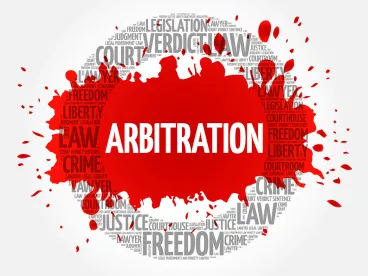Want to give up a contractual right to arbitrate? Easy. Don’t seek to enforce it. For example, just litigate for a while and don’t mention your arbitration clause. The court has no obligation sua sponte to raise or enforce your contractual right if you choose not to. Or do nothing at all. At least two New York State trial courts tell us that your unexcused default in responding to a summons and complaint can be deemed a waiver of a contractual right to arbitrate. See, Crowdpay US Inc. v. Midnight Gaming Corp. (a/k/a McGraw Inc.), 2019 N.Y. Misc. LEXIS 389 (Sup. Ct. N.Y. Co. Jan. 23, 2019); Charming Shoppes, Inc. v. Oberling Constr. Inc., 186 Misc.2d 293, 297, 717 N.Y.S.2d 860, 2000 N.Y. Misc. LEXIS 471 (Sup. Ct. Monroe Co. 2000). Those courts granted default judgments on contract claims in such circumstances notwithstanding that the contracts in question contained arbitration clauses. [1]
An agreement to arbitrate can be enforced in a court by, e.g., a motion to compel arbitration or to stay litigation. But what if a contracting party fails to appear to seek that enforcement?
In Crowdpay, the plaintiff brought suit for a breach of a license agreement. The defendant failed to respond to the complaint and the plaintiff sought a default judgment under N.Y. CPLR §3215 (“default judgment”).
The court noted that the contract in question “contained a provision requiring that disputes arising under the contract ‘shall’ be arbitrated,” 2019 N.Y. Misc. LEXIS 389 at *1-*2, and that plaintiff had argued that the defendant “waived” any right to arbitration due to its default, albeit without citing any supporting authority. The court, however, later found such authority in the Charming Shoppes decision. There, the court had held that “the Defendant effectively waived its right to enforce the arbitration clause when it failed to answer in response to the summons and complaint under circumstances where there was no reasonable excuse for such default.” 2000 N.Y. Misc. LEXIS 471 at *7-*8.
In Crowdpay, the court granted the plaintiff’s motion for a default judgment but deferred ruling on whether the defendant had waived its right to arbitrate “unless and until defendant makes a motion to vacate the default judgment and asserts a right to arbitrate the dispute.” 2019 N.Y. Misc. LEXIS 389 *2-*3. (The court allowed that the defendant might successfully seek vacatur of the default judgement if he could satisfy the relevant requirements of N.Y. CPLR § 5015 or some other relevant law. (Id. at *3.))
The Charming Shoppes decision presented a more complex situation and a less satisfying analysis. There, the plaintiff brought suit for breach of contract, seeking specific performance, and sought a default judgment when the defendant failed to answer the summons and complaint. Weeks after that, defendant’s counsel contacted plaintiff’s counsel, and continuances were eventually granted to allow the parties to try to negotiate a settlement. Those negotiations failed after several months, and defendant then filed a “cross-motion” seeking to compel arbitration among other things. The court granted plaintiff’s motion and denied defendant’s cross-motion, holding that the defendant had waived any right to compel arbitration by failing to answer the complaint, by delaying the progress of the suit, and by participating in settlement conferences and negotiations.
The court opined that in general “a defendant may waive any right to submit issues to arbitration by his actions.” 2000 N.Y. Misc. LEXIS 471 at *8 (“a defendant may ‘waive[] any right to stay the action [based on an arbitration clause] by its affirmative use of the judicial proceedings’”), citing DeSapio v. Kohlmeyer, 35 N.Y.2d 402, 405 (1974). It also opined that
“[t]hough arbitration clauses are generally enforceable, they cannot be used to bypass the statutory provisions requiring that pleadings be answered or to thwart a proper motion for a default judgment.” Id. at *7.
The Charming Shoppes court too allowed that such a waiver could be “set aside” if the defendant demonstrated that a default judgment was not warranted. Id. at *8. However, the court found that the defendant there had failed to demonstrate a basis for denying a default judgment.
The Charming Shoppes court also opined that the defendant’s participation in a lawsuit could manifest an “affirmative acceptance of the judicial forum,” which would be inconsistent with a later claim that only the arbitral forum is satisfactory. Id. at *9. A bit less satisfyingly, however, the court found such “participation” in defendant’s (i) failure to answer the summons and complaint, id. at *9 n.2; (ii) participation in settlement conferences and its agreement to a settlement in principle, id. at *12; (iii) requests for adjournment of the default judgment motion, id.; (iv) eliciting of relevant information concerning the issues in the case from the plaintiff during settlement discussions, id.; and (v) delay of a default judgment for approximately three months, id. at *12. This justification seems questionable.
But it illustrates the perils of failing to make a timely response to the commencement of suit by an adversary, even if that initiation of litigation was contrary to an applicable arbitration agreement.
[1] And the default judgments were not assailable on the grounds that there were applicable agreements to arbitrate.



 />i
/>i
